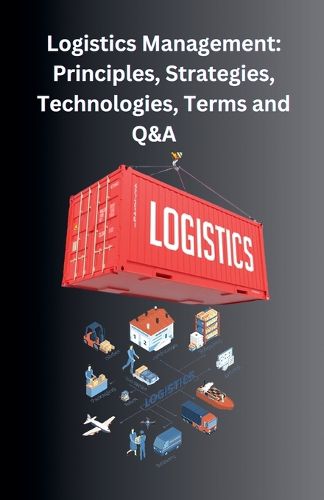Readings Newsletter
Become a Readings Member to make your shopping experience even easier.
Sign in or sign up for free!
You’re not far away from qualifying for FREE standard shipping within Australia
You’ve qualified for FREE standard shipping within Australia
The cart is loading…






This title is printed to order. This book may have been self-published. If so, we cannot guarantee the quality of the content. In the main most books will have gone through the editing process however some may not. We therefore suggest that you be aware of this before ordering this book. If in doubt check either the author or publisher’s details as we are unable to accept any returns unless they are faulty. Please contact us if you have any questions.
Logistics is a critical aspect of modern business, and its effective management is essential for companies to remain competitive in today's global marketplace. Logistics Management: Principles, Strategies, Technologies, Terms, and Q&A is a logistics guidebook that explores the various functions of logistics management, including transportation, distribution, inventory management, warehousing, supply chain management, logistics questions, answers, terms, and performance measurement.
This logistics management books provides readers with a detailed understanding of the key principles and strategies of logistics management, and how they can be applied to enhance the operational efficiency of their organizations. It covers the latest trends and technologies in logistics, including the use of automation, artificial intelligence, and blockchain, and explains how these innovations can be leveraged to improve logistics performance and sustainability.
The logistics books also provide insights into the various types of logistics outsourcing and the factors that organizations should consider when outsourcing their logistics operations. It also explores the importance of logistics sustainability and provides strategies for improving the environmental and social impacts of logistics.
With case studies and examples from real-world logistics operations, terms, and interview Q&A this logistics management book provides readers with practical insights and recommendations for enhancing their logistics operations. It is a valuable resource for students, academics, and professionals in logistics management, as well as for anyone interested in understanding the key principles and strategies of logistics management.
$9.00 standard shipping within Australia
FREE standard shipping within Australia for orders over $100.00
Express & International shipping calculated at checkout
This title is printed to order. This book may have been self-published. If so, we cannot guarantee the quality of the content. In the main most books will have gone through the editing process however some may not. We therefore suggest that you be aware of this before ordering this book. If in doubt check either the author or publisher’s details as we are unable to accept any returns unless they are faulty. Please contact us if you have any questions.
Logistics is a critical aspect of modern business, and its effective management is essential for companies to remain competitive in today's global marketplace. Logistics Management: Principles, Strategies, Technologies, Terms, and Q&A is a logistics guidebook that explores the various functions of logistics management, including transportation, distribution, inventory management, warehousing, supply chain management, logistics questions, answers, terms, and performance measurement.
This logistics management books provides readers with a detailed understanding of the key principles and strategies of logistics management, and how they can be applied to enhance the operational efficiency of their organizations. It covers the latest trends and technologies in logistics, including the use of automation, artificial intelligence, and blockchain, and explains how these innovations can be leveraged to improve logistics performance and sustainability.
The logistics books also provide insights into the various types of logistics outsourcing and the factors that organizations should consider when outsourcing their logistics operations. It also explores the importance of logistics sustainability and provides strategies for improving the environmental and social impacts of logistics.
With case studies and examples from real-world logistics operations, terms, and interview Q&A this logistics management book provides readers with practical insights and recommendations for enhancing their logistics operations. It is a valuable resource for students, academics, and professionals in logistics management, as well as for anyone interested in understanding the key principles and strategies of logistics management.